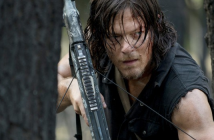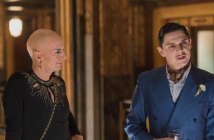May 10, 2015, 9:00 p.m. (EST), HBO
As much as Game of Thrones is an epic that spans continents and tells the tale of a mighty power struggle between factions with long histories, it is also an intimate character study. Though the show is interested in the slow, painful evolution of systems, it is also fascinated by the ways that same growth is reflected in individual characters. Last week, we talked about the way the powerful tend to reassert their power, the ways that systems themselves are structured to fight against change. People aren’t necessarily much different, at the end of the day. Real change is difficult to attain, a constant process of struggling against baser desires and worse instincts to find a better path. “Kill the Boy” takes the epic battles of last week’s episode, and renders them microcosmic, revealing internal struggles of three particular characters who may be smart enough to understand change.
In the speech that gives the episode its title, Maester Aemon tells Jon Snow, in effect, that it is time to grow up. Jon is generally considered one of the less interesting characters in A Song of Ice and Fire for how morally rigid he tends to be, and how steadfastly he seems to adhere to the classic model of the hero that most of the series works so hard to subvert. Yet his tenure as Lord Commander, new though it is, provides a chance for him to evolve, and presents him with his greatest challenges yet. In some ways , Game of Thrones is a long series of tryouts for who would make the best ruler. Some, like Joffrey or Robb Stark, strike out early. Others, like Tyrion or Varys, are left with fatal flaws that render them incapable of winning people over, of truly ruling against the opposition they would be bound to face. Being elected Lord Commander is Jon Snow’s biggest test yet, and in many ways, it mirrors Daenarys’ struggles to rule Meereen. It can be difficult to rule in hard times, much more so when your rule is tenuous at best. Jon Snow has to make tough calls. He has taken an oath to lead a very small band of people against an insurmountable foe, and he faces unpopularity among his men, and an utter lack of support from most of the power structure in Westeros. He has been given the rawest deal he could imagine. He has been asked to basically train the Bad News Bears to win the big game, except the kids are a bunch of psychos, murderers, rapists, and Sam Tarlys, and the opposing team is an undead horde of ice monsters and zombies. Against that, Jon chooses, again and again, to take the hard road. His commitment to doing what is best wins him no friends. But if he can kill the boy inside himself and emerge as the leader the Night’s Watch needs, he may literally save the world.
Meanwhile, across the Narrow Sea, Dany is still struggling with how, exactly, to win the hearts and minds of the deeply divided Meereen. Game of Thrones positions Dany as basically the best possible ruler: stern, yet fair; wise, yet open-minded; just, yet decisive. So it makes sense that her “audition” for the Iron Throne would be among the toughest. Faced with the massacre by the Sons of the Harpy, she feeds one of the scions of a great family to her dragons, and seems poised to just burn down the power structures of this society. It’s what she’s done everywhere else on her journey so far, after all, and she’s doing pretty well for herself (she has a pyramid. Do you have a pyramid?). But she realizes that can’t work here. You can take power by burning down the powerful. A revolution can be waged against the system as it stands. But a ruler must be more than a revolutionary. A ruler can’t burn down their kingdom, lest they be left with nothing to rule. So Dany, realizing her favorite strategy cannot solve the problem, decides she can rebuild Meereen only by making some compromises with its sordid history, reopening the fighting pits and marrying herself to one of the City’s great sons. It’s shrewd politicking, to be sure, even if it feels like Dany is losing a lot for gains that still feel nebulous. Yet it showcases the tensions within Daenerys Targaryen, and how brilliant she is at determining when she is forced to evolve. Her quest is focused on tearing down old ways of doing things, but to win the game of thrones, she’ll have to learn how to build something lasting in their place.
Tyrion Lannister learned, over the course of the show’s first two seasons, what his purpose in life was, and then watched as circumstances beyong his control tore everything from him. Tyrion was happiest when he was the Hand of the King, quietly guiding the Kingdom in the right direction, advising on how best to rule. Yet he was also exposed to the rot at the core of Westeros, the way the system was rigged to keep the powerful in power, and to keep someone like him, a child of privilege, yes, but also someone who could never be seen as more than deformed from the power and influence he rightly deserved. Tyrion shooting Tywin and strangling Shae was his “Dracarys” moment, his burning the slavers of Yunkai. Having burned his kingdom to ash, Tyrion chased meaning to the bottom of whatever bottle he could find, and this year, he’s on a journey to find something worth fighting for again. We know what he will see when he reaches Dany. We know, even if they don’t yet, that these two would be a great pair, and a nearly unstoppable team. But Tyrion has to fight his worst tendencies. He, like Jon Snow and Danerys Targaryen alongside him, has to kill the boy in order to become the man he will need to be to take his rightful place in the world.
“Kill the Boy” is smart about the difficulties of change, and about the honest challenges that face these three characters, both policially and personally. At this point in their journeys, each of them faces incredible challenges externally. But just as crucially, each of them is poised on a precipice of personal growth. Each of them must come up against the weakness of their old ways of doing things, and find better paths forward. Jon Snow cannot rely on his nobility without winning less noble minds over to his cause. Daenerys Targaryen cannot burn down old systems without building something sturdy to replace them. Tyrion Lannister cannot wallow in wine and cynicism when he could be building something better than the world that has done him so wrong. For any of these people to succeed, they will have to put aside their past and move forward. They will have to learn to find strength from their weaknesses. They will have to fight the inexorable tide of stasis, weather an uphill struggle, and change.
The Roundup
- “A Targaryen alone in the world is a terrible thing.”
- “You will find little joy in your command. But, with luck, you will find the strength to do what needs to be done. Kill the boy, Jon Snow. Winter is almost upon us. Kill the boy, and let the man be born.”
- “Less enemies for us!” “Fewer.” “What?” “Nothing.”
- “Long, sullen silences and an occasional punch in the face. The Mormont way.”
- “I suppose this is it, then. This is what remains.”
- SPOILERS So the attack by the Stone Men marks this as a huge departure from the books, as Jorah gets greyscale, while “Griff” is nowhere to be seen. If the show is cutting Jon Connington and young Aegon Targaryen from the story, that marks arguably the largest departure yet from the source material, and may mean some very large changes to the show down the line, or some revelations about what events in the book mean and how they will transpire. I was suspicious that those two hadn’t shown up earlier and wondered if their appearance was being pushed. Now I wonder if they are being written out entirely…
“Kill the Boy” is smart about the difficulties of change.
-
GREAT




